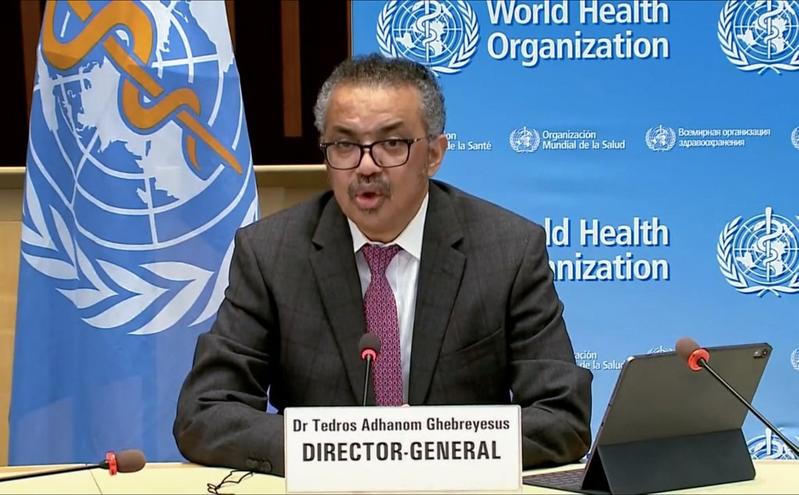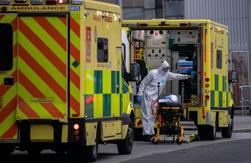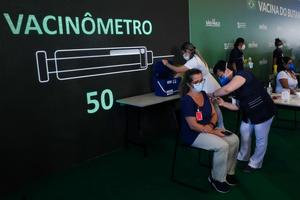 This handout TV grab taken on Jan 5, 2021 shows World Health Organization Ethiopian Director-General Tedros Adhanom Ghebreyesus during a press briefing on COVID-19 via video link from the WHO headquarters in Geneva. (HANDOUT / WORLD HEALTH ORGANIZATION / AFP)
This handout TV grab taken on Jan 5, 2021 shows World Health Organization Ethiopian Director-General Tedros Adhanom Ghebreyesus during a press briefing on COVID-19 via video link from the WHO headquarters in Geneva. (HANDOUT / WORLD HEALTH ORGANIZATION / AFP)
STOCKHOLM / RIO DE JANEIRO / WASHINGTON / NEW YORK / LONDON / PARIS / BERLIN / LISBON / CARIO - The world is on the brink of “catastrophic moral failure” in sharing COVID-19 vaccines, the head of the World Health Organization said on Monday, urging countries and manufacturers to spread doses more fairly around the world.
WHO Director-General Tedros Adhanom Ghebreyesus said the prospects for equitable distribution were at “serious risk” just as its COVAX vaccine-sharing scheme aimed to start distributing inoculations next month.
He noted 44 bilateral deals were signed last year and at least 12 have already been signed this year.
“This could delay COVAX deliveries and create exactly the scenario COVAX was designed to avoid, with hoarding, a chaotic market, an uncoordinated response and continued social and economic disruption,” he said.
Such a “me-first approach” left the world’s poorest and most vulnerable at risk, he said at the opening of the body’s annual Executive Board meeting in virtual format.
“Ultimately these actions will only prolong the pandemic,” he added, urging countries to avoid making the same mistakes made during the H1N1 and HIV pandemics.
The global scramble for shots has intensified as more infectious virus variants circulate.
Tedros said more than 39 million vaccine doses had been administered in 49 higher-income countries whereas just 25 doses had been given in one poor country.
US
President-elect Joe Biden’s goal of delivering 100 million doses of COVID-19 vaccine within the first 100 days of his presidency “is absolutely a doable thing,” Anthony Fauci, director of the National Institute of Allergy and Infectious Diseases, said on Sunday.
Fauci, speaking on NBC’s “Meet The Press”, said two new vaccines under development by AstraZeneca and Johnson & Johnson could “very soon” be presented to US regulators for approval, which would increase the pace of vaccinations. “We’re weeks away, not months away, for sure,” he said.
About a month after COVID-19 vaccine rollout began in the United States, it is still impossible for the public and the media to track the rollout of vaccines in nursing homes, assisted living facilities, and other long-term-care facilities (LTCF) in most states, said a latest report of The COVID Tracking Project.
In most states, the details of vaccine rollouts across the country's LTCF remain "closely guarded," according to the report.
Hospitalizations for the coronavirus surpassed 130,000 last week, new data from the Department of Health and Human Services show. COVID-19 in-patients jumped 7.3 percent to 131,637 from Dec. 29 to Jan. 15, the data show.
The US death toll neared 400,000.
READ MORE: World hits 2 million COVID-19 deaths with cases still surging
UK
The United Kingdom is vaccinating 140 people per minute against COVID-19 on average, Vaccine Deployment Minister Nadhim Zahawi said on Monday.
Zahawi also said that Britain’s vaccine rollout is limited by a “lumpy” manufacturing process with production changes by Pfizer and a delay by AstraZeneca that could lead to brief supply disruption.
Key workers in Britain such as teachers, the police and shopworkers could move to the top of the list for a vaccine once all those over 50 have been offered a shot, the vaccine deployment minister said on Monday.
The United Kingdom, which has the world’s fifth worst official COVID-19 death toll, is racing to be among the first major countries to vaccinate its population - seen as the best way to exit the pandemic and get the economy going again.
Vaccines will be offered to people aged 70 and over, and those deemed “clinically extremely vulnerable” from Monday -- the third and fourth priority groups. Prime Minister Boris Johnson called it a “significant milestone” in the vaccination effort.
Britain’s government hopes to ease some lockdown restrictions in March as it presses ahead with Europe’s fastest rollout of COVID-19 vaccines, foreign minister Dominic Raab said on Sunday.
The country, which also has Europe’s highest COVID-19 death toll, has been under national lockdown since Jan 5, with schools closed for most pupils, non-essential businesses shut and people ordered to work from home where possible.
 This April 8, 2020 photo shows a vial of the drug Remdesivir pictured during a press conference in Hamburg, northern Germany, amidst the new coronavirus pandemic. (ULRICH PERREY / POOL / AFP)
This April 8, 2020 photo shows a vial of the drug Remdesivir pictured during a press conference in Hamburg, northern Germany, amidst the new coronavirus pandemic. (ULRICH PERREY / POOL / AFP)
Global cases
The confirmed COVID-19 infections around the world has passed 95 million while the deaths surpassed 2 million, according to data compiled by the Center for Systems Science and Engineering (CSSE) at Johns Hopkins University.
France
France will comfortably reach its target for 1 million COVID-19 vaccinations by the end of January, Health Minister Olivier Veran said. Vaccine doses are being made available as they arrive, with appointments for the French to get the jab corresponding to available supplies, he said.
France is “very reluctant” to back any move by the EU to create vaccination passports that would allow people who have been inoculated against COVID19 to travel, Clement Beaune, junior minister for European Affairs, told France Info radio on Sunday.
“It’s premature” to discuss using a document of this type to allow travel within Europe, at least until the vaccine is widely available, he said.
France registered 16,642 new coronavirus cases in the last 24 hours, according to figures released by the Public Health Agency on Sunday.
France's cumulative total of COVID-19 cases now stands at 2,910,989. The death toll went up by 141 in 24 hours to reach 70,283.
ALSO READ: Italy bans flights from Brazil after new virus variant reported
Germany
An intensified and targeted search for new COVID-19 variants would be carried out in Germany to get a better overview of the variants circulating in the country, as Minister of Health Jens Spahn presented a new decree on Monday.
The decree, effective from Tuesday, would aim to test at least five percent of positive COVID-19 samples for mutations. The laboratories and facilities that carry out the genome sequencing would transmit the collected data to the Robert Koch Institute (RKI), the federal government agency for disease control and prevention.
German Chancellor Angela Merkel and state leaders appear likely to extend lockdown measures until at least mid-February and may impose a curfew in hotspots.
Merkel and the state premiers are due to decide on the latest strategy to stem the spread of the disease during a video call on Tuesday. The talks were brought forward after the German leader warned that the current shutdown may have to be prolonged until Easter due to risks posed by variants that can spread more quickly.
Finance Minister Olaf Scholz said late Sunday current measures appear to be having an effect, but that more progress is needed, warning that mutations could have “a dramatic impact.”
Several German states plan to detain quarantine breakers, Welt am Sonntag reported. People who repeatedly violate quarantine orders face detention in some German states, in addition to high fines, the newspaper reported, citing its own inquiries.
Sweden
Sweden continues to buy and use the antiviral drug Remdesivir to treat COVID-19 patients, despite the World Health Organization (WHO)'s advice against doing do, Swedish News Agency TT reported on Sunday.
"We believe that there is still a place for remdesivir," Charlotta Bergquist, group manager and vaccine coordinator at the Swedish Medical Products Agency, told TT, explaining that the drug could help reduce hospital care time for a specific patient group.
COVID-19 patients who are at an early stage of the disease and who receive oxygen supplementation can go home from hospital several days earlier if they receive treatment of Remdesivir, according to the report.
She said it's true that remdesivir did not have a proven effect on mortality of COVID-19 patients, but "WHO has only looked at mortality, which is a fairly rough measure."
In November 2020, WHO issued a conditional recommendation against the use of remdesivir in hospitalized patients, regardless of disease severity, as there is no evidence that remdesivir improves survival and other outcomes in these patients.
Sweden’s Prime Minister Stefan Lofven has said he can’t rule out further restrictions under a temporary new law to combat the spread of the coronavirus pandemic.
“But I hope we won’t need to use it,” he said during an interview on state broadcaster SVT on Sunday evening. The law, which runs from January until September, gives Lofven’s government the right to shutter businesses and fine citizens that fail to comply with tougher restrictions.
 A worker cleans the inside of an ambulance after arriving at The Royal London Hospital, Jan 9. (PHOTO / BLOOBERG)
A worker cleans the inside of an ambulance after arriving at The Royal London Hospital, Jan 9. (PHOTO / BLOOBERG)
Bulgaria
Bulgaria reported 77 new coronavirus cases, the lowest number since October. The government in the Balkan country, which entered a partial lockdown in late November after it reached the European Union’s highest death rate, will discuss the easing of some of the measures, Labor Minister Denitsa Sacheva said in a televised interview. Authorities are considering options for the secondary and high school students to return to school.
Bulgaria received a supply of 18,720 Pfizer shots on Monday and will start the second phase of vaccination, targeting nursing homes and school teachers after about 18,000 medical workers received their first shot.
Austria
Austria will keep its current lockdown in place until Feb. 7. It will shut restaurants, cafes and hotels for at least all of February and tighten mask and distancing requirements as more infectious coronavirus mutations accelerate the spread of the disease.
Belarus
Belarus reported 1,924 new COVID-19 cases on Sunday, taking its total to 225,461, according to the country's health ministry.
There have been 2,532 new recoveries in the past 24 hours, bringing the total to 209,208, the ministry added.
So far, 1,582 people have died of the disease in the country, including nine over the past 24 hours, it said.
As of Sunday, 4,259,914 tests for the virus have been conducted across the country, including 21,050 over the past 24 hours, according to official figures.
Ireland
Ireland expects coronavirus hospitalizations to peak “in the next week or two,” Health Minister Stephen Donnelly told state broadcaster RTE Radio, even as the nation ramps up its vaccination program.
The country has seen one of the worst virus outbreaks in the world since the new year, with hospitalizations almost double the previous high in April. Daily infections have started to fall, however, and on Sunday, the 2,944 cases reported were the lowest since New Year’s Day, health authorities said.
Netherlands
Dutch riot police used water cannon to disperse around two thousand people at an unauthorised protest in Amsterdam on Sunday against a national lockdown to slow the spread of coronavirus.
The protesters gathered on a square in front of the Rijksmuseum and Van Gogh Museum art galleries, carrying signs reading “Freedom: stop this siege” and chanting “What do we want? Freedom!”.
None wore masks, which are not mandatory outdoors, and few respected social distancing rules, prompting the authorities to disperse the crowd due to health concerns, the Amsterdam authorities said in a statement.
Portugal
Portugal’s public health system is on the verge of collapsing as hospitals in the areas worst-affected by a worrying surge in coronavirus cases are quickly running out of intensive care beds to treat COVID-19 patients.
“Our health system is under a situation of extreme pressure,” Health Minister Marta Temido told reporters on Sunday afternoon after a visit to a struggling hospital. “There is a limit and we are very close to it.”
The health system, which prior to the pandemic had the lowest number of critical care beds per 100,000 inhabitants in Europe, can accommodate a maximum of 672 COVID-19 patients in intensive care units, or ICUs, according to health ministry data.
Russia
Russia registered 22,857 new COVID-19 cases in the past 24 hours, taking its total to 3,591,066, the country's COVID-19 response center said in a statement Monday.
It said that 471 new deaths were reported, taking the nationwide count to 66,037.
According to the statement, 2,978,764 people have so far recovered, including 18,333 recoveries over the past day.
Moscow, the country's worst-hit region, reported 3,679 new cases, taking its tally of infections to 895,327, the response center said.
Brazil
Brazil will begin mass vaccination against COVID-19 starting Wednesday, its health ministry announced Sunday.
The Brazilian government will begin to distribute vaccines throughout the country starting early Monday morning, Health Minister Eduardo Pazuello told a press conference.
The decision came after Brazil's Health Regulatory Agency unanimously approved on Sunday the emergency use of the CoronaVac vaccine, from the Chinese laboratory Sinovac, as well as the AstraZeneca-University of Oxford vaccine.
The vaccines will be delivered by the Brazilian Air Force "to strategic points" in each state, and on Wednesday, vaccination will begin throughout the country.
Brazilian nurse Monica Calazans, 54, became the first Brazilian to be vaccinated against the novel coronavirus on Sunday after Brazilian health authorities approved the emergency use of the vaccines.
 A nurse administers a dose of the CoronaVac vaccine to a medical worker in Sao Paulo on Jan 17. (PHOTO / BLOOMBERG)
A nurse administers a dose of the CoronaVac vaccine to a medical worker in Sao Paulo on Jan 17. (PHOTO / BLOOMBERG)
Cuba
The Cuban Ministry of Public Health reported four deaths and 650 new cases of the novel coronavirus disease (COVID-19) on Sunday, a daily record since the pandemic first hit the country.
"650 new cases were diagnosed, the highest number we have had so far," said the ministry's national director of hygiene and epidemiology Francisco Duran.
The province of Guantanamo has become the epicenter of the disease, reporting 206 patients with COVID-19, with Havana maintaining stability with 153 cases, followed by Santiago de Cuba with 68.
"We are in a complex situation, with the provinces of Havana, Matanzas, Santiago de Cuba and Guantanamo in the local transmission phase," said Duran.
Cuba has registered 170 deaths and 18,151 cases of COVID-19 so far.
Chile
New cases of COVID-19 in Chile have increased 58 percent in the last two weeks, the Ministry of Health said on Sunday.
According to the ministry, 4,340 new cases of the novel coronavirus were reported in the last day, for a total of 669,832 cases.
To date, 25,429 patients are in the active or contagious stage of the virus, while 626,528 have recovered.
Algeria
Algeria on Sunday reported 222 new COVID-19 cases in the past 24 hours, bringing the total infections in the North Africa country to 103,833.
The death toll from the coronavirus in Algeria rose to 2,836 after five new fatalities were recorded, said the Algerian Ministry of Health in a statement.
Meanwhile, 181 more patients recovered from the disease and were discharged from hospitals, bringing the total number of recoveries in the country to 70,614.
Djamel Fourar, the spokesperson of the Algerian Scientific Committee monitoring the spread of COVID-19, said on Sunday that Algeria will launch the training for the supervisors of the vaccination campaign against the COVID-19 from this week.
Morocco
Morocco's COVID-19 tally rose to 459,671 on Sunday as 806 new cases were registered during the past 24 hours.
According to a statement by the Ministry of Health, the death toll mounted to 7,942 as 31 COVID-19 patients died in the last 24 hours.
The total number of recoveries from COVID-19 in Morocco increased to 434,925 after 988 new ones were added, while 937 people are in intensive care units, the statement said.
Ghana
Ghana’s COVID-19 infection rates are skyrocketing and include new strains of the virus not before seen in the country, filling treatment centres and threatening to overwhelm the health system, President Nana Akufo-Addo said on Sunday.
Since Jan. 5, the number of active cases has risen to 1,924 from about 900, Akufo-Addo said in a speech. There are now 120 severe cases, up from 18 a week ago.
Ghana is not yet close to a peak seen during the first wave of infections in the middle of last year, but could quickly reach that level if cases keep rising at the current rate.
If they do, the president said he would impose another partial lockdown, despite worries about what that would do to one of West Africa’s largest economies.
Ethiopia
The Ethiopian Ministry of Health said Sunday the total number of confirmed COVID-19 cases in the East African country rose to 131,195, after new 423 cases were reported.
The ministry said that the number of deaths from the virus in the country reached 2,030 as of Sunday evening, including one new death reported during the last 24 hours.
The ministry further said that 102 patients have recovered in the past day, bringing the total recovery number to 116,147 so far.
It said that 13,016 cases of COVID-19 are active ones, 225 of which are said to be under severe conditions.
Malawi
Malawi President Lazarus Chakwera has announced new measures against the spread of COVID-19 amid rising infections and mounting deaths related to the pandemic in the country.
The measures include closure of non-boarding schools for three weeks and disinfection, at least once a week, of all buildings used by the public, and installation of handwashing facilities at their entrances and exits.
"Any person found in public without a mask will be fined," Chakwera said in an address to the nation late Sunday.
Norway
Health authorities in Norway say there’s no evidence of a direct link between the recent string of deaths among elderly people inoculated against COVID-19, and the vaccine they received.
The Norwegian Medicines Agency is seeking to address fears that taking the vaccine might be too risky, after 33 people in the country aged 75 and over died following immunization, according to the agency’s latest figures. All were already seriously ill, it said.
“Clearly, COVID-19 is far more dangerous to most patients than vaccination,” Steinar Madsen, medical director at the Norwegian Medicines Agency, said by phone on Monday. “We are not alarmed.”
The initial reports from Norway made international headlines as the world looks for early signs of potential side effects from the vaccines. Until Friday, Norway had only used the vaccine provided by Pfizer Inc and BioNTech SE, and the companies are now working with the Nordic country to look into the deaths. The first Europe-wide safety report on the Pfizer-BioNTech vaccine is due to be published at the end of January.
“All of these patients have had serious underlying illnesses,” Madsen said. “We can’t say that people die from the vaccine. We can say that it may be coincidental. It is difficult to prove that it’s the vaccine which is the direct cause.”
 A healthcare worker prepares a dose of the Pfizer-BioNTech COVID-19 vaccine at the Ambroise Pare Clinic in Paris, France, Jan 6, 2021. (NATHAN LAINE / BLOOMBERG)
A healthcare worker prepares a dose of the Pfizer-BioNTech COVID-19 vaccine at the Ambroise Pare Clinic in Paris, France, Jan 6, 2021. (NATHAN LAINE / BLOOMBERG)
The EU
The European Union’s executive arm will urge member states to set a target for vaccinating at least 70 percent of the bloc’s population by this summer, according to a draft of the latest pandemic response recommendations due to be released Tuesday.
The European Commission will also vow to agree with member states by the end of this month on a protocol for vaccination certificates “which can be recognized and used in health systems across the EU - and which could be scaled up globally in coordination with the World Health Organization,” according to the draft of the document seen by Bloomberg.
Such certificates could replace quarantines and test-requirements, proving that “you are no longer high-risk for travel.”
The draft policy paper, which is still subject to changes until it’s formally adopted on Tuesday, comes amid an increase in infections that has forced EU governments to prolong recession-inducing lockdowns. It also follows an underwhelming rollout of vaccinations across the continent that has left the EU lagging behind the US, the UK and other developed nations.
EU leaders will seek ways to up their game when they hold a video conference on Thursday, which is meant to be informed by the latest commission proposals. Among the most controversial issues on the table is a push for the introduction of vaccination certificates that would allow travel to resume - at least for those who receive the jab.


